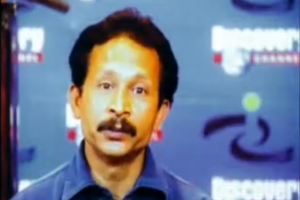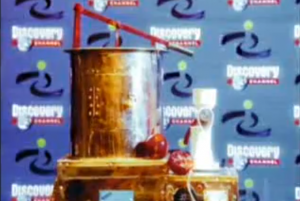Nasa honours Indian inventors including one who built pomegranate deseeder

Pomogranate, high in vitamins and anti-oxidants is often an ignored fruit because of the laborious and time-consuming process to separate the juicy seeds from the skin and the fruit’s membranes.
45-year-old Bharali who is from North Lakhimpur has built a cylindrical device that can automatically deseed pomegranate. According to the American magazine the device can completely deseed a pomegranate in a few seconds.
How Bharali’s pomegranate deseeder works:
A pomegranate has to be halved and inserted into the cylindrical container. The fruit then falls on to a rotating disc at the bottom of the cylinder. This disc has tiny openings that let out loose pomegranate seeds to fall into a secondary container at the bottom.

There is a rounded pillar attached to the inner surface of the cylinder which hits the rotating pomegranate applying gentle pressure and causing the seeds to loosen and fall off while leaving the outer skin intact.
Out of a total number of more than 12,000 entries, 433 inventions were chosen for an online vote including five Indian inventions. Bharali’s idea received 995 votes.
Here is a video of Uddhab Bharali talking about his pomegranate deseeder. The video has been uploaded by National Innovation Foundation, India:
Among other popular inventions from India were a Delhi-based engineer Jaideep Singh’s eco-friendly idea of converting vehicular emissions into fuel helping cut pollution. Singh’s invention received 328 votes.
Bangalore’s Amit Badlani devised an adaptive smart-home technology that understands human behaviour and adjusts aspects such as light, music sound, and fan-speed etc. saving electricity.
More like this
Another invention from India that proved popular was a healthcare-related invention from a student called Avantika from Bihar. Her portable and user-friendly device would keep track of the vaccines that a child has already received while providing reminders for forthcoming ones. The device helps take guesswork out of child immunization programmes.
Lastly, a group of engineers from IIT Bombay including Amit Mangtani, Apoorv Maheshwari, Achyut Panchal, Pranav Raheja, Raj Patel, Mitanshu Sharma, and Nishant Khanduja designed a contra-rotating mini axial compressor which received 122 votes in the Nasa Create the Future Design 2012 contest.
Most read
- 2017: Full list of Indian States, capitals and their Chief Ministers; Nitish Kumar quits and takes oath again as Bihar CM!
- Ram Nath Kovind is 14th Indian President after Pranab Mukherjee. Here's a list of all Indian Presidents since 1950
- List of all the major rivers of India: Names, Origin and Length
- Indian cabinet 2017: Full list of Ministers and their portfolios in Narendra Modi government
- Dosa recipe: How to make crispy Paper Dosa and Masala Dosa
- South Indian actress Trisha Krishnan’s father passes away
- Watch Delhi bride Amisha Bhardwaj’s funky wedding dance video that is now globally viral
- IIFA 2017 New York Pics: Bollywood stars ooze glamour at the green carpet
- Indian Independence Day Celebrations 2017: 71st Independence Day at London's The Bhavan
- Commonwealth Games 2014: Full list of Indian gold, silver and bronze medal winners
India News Bulletin by email
More Lead Stories
- 2017: Full list of Indian States, capitals and their Chief Ministers; Nitish Kumar quits and takes oath again as Bihar CM! Updated 15 hours ago
- Indian train meals not protected from rats, cockroaches, dust, insects, warn auditors
- IIFA 2017 New York Pics: Bollywood stars ooze glamour at the green carpet
- Paris Couture Week Pics: Sonam Kapoor charms like a princess in bridal wear
- London Grenfell Tower Fire – Key facts and pics












